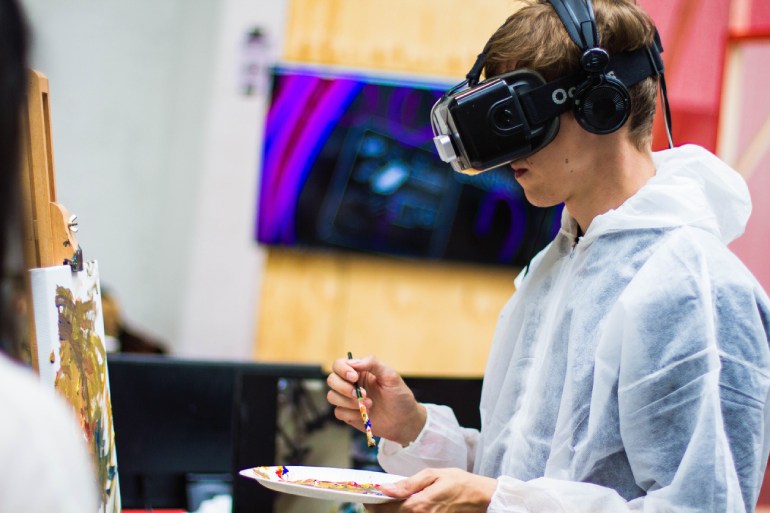 The term “Metaverse” is not only finding its way into everyday exchanges across the web, pop culture and mainstream news media discourse, but also into closed-door corporate discussions as industries ruminate on if—and how—to be an early adopter of this modality. This understanding it represents a seismic shift that will challenge technological and cultural paradigms.
The term “Metaverse” is not only finding its way into everyday exchanges across the web, pop culture and mainstream news media discourse, but also into closed-door corporate discussions as industries ruminate on if—and how—to be an early adopter of this modality. This understanding it represents a seismic shift that will challenge technological and cultural paradigms.
The term Metaverse is broad, encompassing several areas, and carries with it a variety of definitions that are largely based on the intended application. One prime description includes 3D virtual worlds that are focused on social connection, which are linked together to further the perception of a virtual universe. It is widely regarded as the next iteration of the world wide web, as well as a term of reference for the digital spaces made more realistic and relatable by the use of augmented reality (AR), virtual reality (VR) and extended reality (XR).
While global industry at large is still in the learning, planning and development stage of the Metaverse technology life cycle, these immersive technologies—along with artificial intelligence (AI)—are already notably impacting one business area in particular, namely corporate e-skills training and development.
The economic impact driven by this particular application cannot be overstated. In fact, forecasts indicate that fully 23 million jobs will be impacted by VR and AR by 2030, potentially boosting the global economy by US$1.92 (£1.4) trillion. Why? One simple reason revolves around the idea that immersive technologies like these, applied in the Metaverse environment, minimize the disconnect between theory and practice.
“Metaverse mixed-reality leaning experiences represent disruptive innovation that can significantly optimize training, development and real learning,” says Ed Beltran, CEO of Fierce Conversations—a global leadership development company that’s pioneering new e-training and communication paradigms. “With companies increasingly moving to remote or hybrid workplace environments, executives not only appreciate the need—but are wholeheartedly embracing—new approaches to train, sustain and develop their teams in order to stay agile and competitive.”
It is certainly no surprise that, in the industrial aftermath of the COVID-19 pandemic, the global e-Learning market is anticipating phenomenal growth, from US$185.26 billion in 2020 to US$388.23 billion in 2026.
According to Beltran, the Metaverse’s mixed-reality learning modalities can supercharge corporate e-skill training in several ways.
When asked how he sees the Metaverse’s applicability for improving internal staff conversations, and if it can lead to demonstrable operational improvements in key areas like corporate culture and productivity, he said: “The answer to this begins with the understanding that conversations are universal. The appropriate words can be translatable to all situations, creating a successful engagement between two or more people that allows them to learn. Using the wrong words has the opposite effect, leading to anger and toxicity that can easily spread to team members. So, the goal with training and development lies with creating customized solutions that foster a rich human connection. This can be achieved through the development of Metaverse techniques that allow teams to engage in any environment, any situation. It could be giving feedback or requesting it, confronting a problem or asking a question to learn more. Conversations improve culture and, in fact, we’ve found that companies providing feedback—whether positive of negative—have 15% lower turnover than those not providing any kind of feedback. Even more surprising is our finding that 47% of people leave their jobs not because of money or duties, but rather because of poor communication and company culture. Developing the solutions needed to improve conversations and corporate culture and enhance productivity must include teaching teams how to deal with issues as they arise, while keeping stress levels at a minimum. Remember that lower stress equals better conversations, happier employees and better returns.”
Ed Beltran emphasizes that “the Metaverse provides fresh, interactive engagement methods vis a vis 3D VR, AR and XR training, which allows people to learn faster, retain information better and actually enjoy the process.”
Given the significant extent to which Metaverse mixed-reality learning modalities can enhance staff and leadership development, and the extreme fiscal upside related thereto, it’s no wonder that the corporate e-skills sector is leading the technology shift charge. In the business realm, remote e-learning is already a key catalyst ushering in brave new virtual world.
By Merilee Kern, MBA
 Forbes Business Council Member Merilee Kern, MBA is an internationally-regarded brand analyst, strategist and futurist who reports on noteworthy industry change makers, movers, shakers and innovators across all B2B and B2C categories.
Forbes Business Council Member Merilee Kern, MBA is an internationally-regarded brand analyst, strategist and futurist who reports on noteworthy industry change makers, movers, shakers and innovators across all B2B and B2C categories.
Connect with her at www.TheLuxeList.com and www.SavvyLiving.tv
Instagram www.Instagram.com/LuxeListReports
Twitter www.Twitter.com/LuxeListReports
Facebook www.Facebook.com/LuxeListReports
LinkedIn www.LinkedIn.com/in/MerileeKern.


